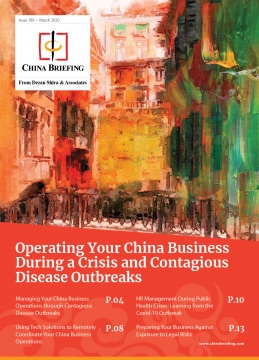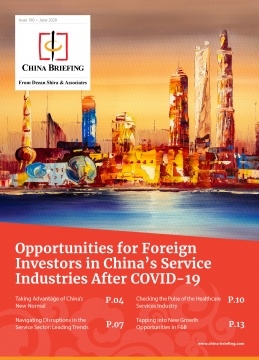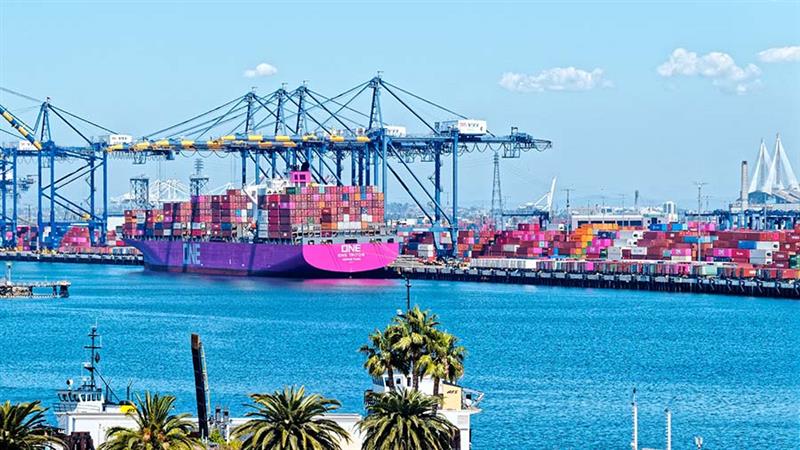Operational Planning for Trading Out of COVID-19 2020 Revenue Downturns
A larger trading problem could arise in 2021. We advise the adaptive steps to take.
Op/Ed by Chris Devonshire-Ellis
Our firm, Dezan Shira & Associates, has just completed our H1 round-up – via Microsoft Teams – as Partners of the firm discussed the outcomes of the first half of 2020.
With 28 offices spread across most of Asia – including China, ASEAN, and India – the practice is well-positioned to provide advice on what is happening in the foreign investment market within the Asian region. And it is that regional spread, developed since the firm first expanded beyond China in 2007 that has meant Dezan Shira is emerging from COVID-19 without many scars.
Although there has been a slight drop in overall revenues, that has been counter-balanced by a sharp drop in expenses, caused mainly by a decrease in travel costs. Yet, that also belies an uncomfortable truth – with that expenses drop already factored in, a further drop in revenues if not managed timely, could create problems for many businesses next year.
Dezan Shira’s way out of this potential downside has been the expansion of revenues from our ASEAN and India operations, with Indonesia, Malaysia, Philippines, Singapore, Thailand, and Vietnam all experiencing an uptick in terms of foreign direct investment. Some of that is attributable to the effects of the US-China Trade War, which has resulted in American export sourcing companies and manufacturers looking elsewhere in Asia to service the US domestic market. That is still an on-going process that has been slowed in part by the advent of COVID-19 but is continuing. Part of it is a search for cost reductions, others for new consumer market access.
I’ve long been wary of putting all our eggs in one basket, and we are seeing China consultants that are focused on just one industry – such as food & beverage or just one country – such as purely China – taking a hammering. There are lessons to be learned here. To balance against that we have gone beyond Asia both in terms of looking for clients and in servicing them. Our first India and Vietnam offices were set up 14 years ago.
Dezan Shira set up a Russian liaison office and began Russia Briefing 10 years ago, and set up a South American trade representative based in Brazil last year. We now produce a large number of China and Asian focused articles in Russian, Portuguese, and Spanish.
My colleague Patrica Varejao in Brazil is now well known as a commentator on Brazil and China trade, and regularly features on TV in South America.
This outreach supplements articles that we have long provided in French, Italian, and German.
These new markets are well worth looking at. Shaun Rein over at China Market Research stated he recently obtained his first Brazilian client. That’s great and illustrates that part of getting through COVID-19 and a potential global depression to come is going to be related to diversity and looking further afield for new business. We expect great things from South America – Asia trade space.
In Russia, we are in the process of becoming the go-to firm for advisory, legal, tax, and operational investments into Asia. Our client base includes manufacturers, research institutes, and banks. We are now reaping the rewards for initiatives we laid down years before.
Others have come a bit late to the party. Harris & Moure, the firm behind China Law Blog have been in a funk all year about China and have been scrambling to find agents in India and other countries. This comes after previous comments doing India down, and I quoted: “Sourcing product from China is far superior and far cheaper than sourcing product (or really anything) from India.” The worm, it appears, has turned. Welcome to India, guys.
But a word about using firms who sub-contract work to agents. Don’t. If they are not prepared to finance and obtain their own licensing in your Asian country of choice, then why are you listening to them? It doesn’t make sense to sub-contract investments into any country using a remote third party. Choose firms with a bona fide presence in-country and not just those who are bandwagon-jumping because their China trade is proving difficult in 2020.
The upshot of all the problems created by COVID-19, our long-term experience on the ground in Asia, and what we can advise clients and businesses (including competitors) in China is as follows:
We expect trading conditions to get far tougher in 2021. That may require a re-examination of your entire business model to ascertain if it remains viable.
Outsource your employee
If not, you need to develop new markets. There are ways to do this inexpensively. Our recent article Planning for Uncertainty: Global Staff Solutions to Facilitate China Market Entry discusses how to look at exploring and trading in new markets without having to set up operations or even hire staff. Given that borders remain closed and flying to China and many other countries right now incurs quarantine, this may be a good option.
Familiarize yourself with new emerging market potential
Examine what is going on in other markets. Not so many foreign investors in China are familiar with the Mercosur Free Trade Bloc. Yet China is the world’s largest consumer of soybeans, and Brazil is the largest producer. With Brazil being a Mercosur member (along with Argentina, Paraguay, Uruguay, and associate states of Bolivia, Chile, Colombia, Ecuador, Guyana, Peru, and Suriname), there are considerable trade opportunities. Understanding what is happening between China and Mercosur is just one example.
The same is true for the African-Continental Free Trade Agreement (AfCFTA) and what is occurring with Russia’s Eurasian Economic Union.
Despite the recent negative press, in trade and investment – China and India are very much together. An analysis of this year’s Q2 Chinese government institutional lending showed India received a lot of money from Chinese supported and invested banks. India, despite not officially being part of China’s infrastructure build around the Belt & Road Initiative, is in fact very much part of it.
Examine available China tax and trade incentives
There are also major opportunities in China that support these. Hainan has just announced new preferential tax policies. As a major port close to Vietnam, it is ideal for the ASEAN trade. China has an extensive Free Trade Agreement with ASEAN.
China has also reduced profits taxes to 15 percent for qualifying businesses in its Western regions. That includes Yunnan, which has border access again to Vietnam, to Laos, and to Cambodia. All are ASEAN members.
The Shanghai Free Trade Zone has instigated reforms that for the first time, offer a raft of available export-financing deals, even for products not sourced in China but that will be sold onto Belt & Road Countries. It may replace Hong Kong in terms of using financial instruments should the US withdraw Hong Kong’s special US trade relationship.
2020 COVID-19 China tax and charges relief
There are also applicable incentives for businesses stressed by the impact of the coronavirus.
E-commerce opportunities and tax incentives
China’s cross-border e-commerce (CBEC) industry is booming in the wake of consumer demand and restrictions bought in by the coronavirus outbreak. Over the last few months, the government has been rolling out policies, including adding new CBEC pilot zones and pilot cities for CBEC retail importation, extending the CBEC retail import list, and lowering tax and tariffs, in a bid to boost CBEC:
- In May 2020, the State Council unveiled 46 new comprehensive pilot zones for CBEC, bringing the total CBEC pilot zones in China to 105.
- In January 2020, five authorities, including the Ministry of Commerce (MOFCOM), jointly released a notice to expand the pilot cities for CBEC retail importation, adding 50 cities and the whole of Hainan island into the pilot scheme of CBEC retail importation.
- In December 2019, 13 authorities extended the “List of Goods under Cross-border E-commerce Retail Importation” to allow more foreign goods to be delivered to Chinese consumers through the CBEC retail importation program.
China wants its citizens to buy online and it is creating avenues for them to do that with overseas sellers. You can read more about this fast-developing new China access market in our article An Introduction to China’s CBEC Pilot Zones and Cities or contact us for details.
Adapt IT Solutions
Working in offices is not going to return as it was before. Fortunately, there are new technologies available and these will reduce risks. New opportunities are also emerging. Over the past 12 months we have published three pertinent issues of China Briefing Magazine:
-
 Back Office Automation in China
Back Office Automation in China -
 Managing a China Business During an Infectious Disease Outbreak
Managing a China Business During an Infectious Disease Outbreak -
 Opportunities for Foreign Investors After COVID-19
Opportunities for Foreign Investors After COVID-19
These magazines are free and can be downloaded by just filling in a simple subscriber form. They outline IT developments and systems to adopt, especially to facilitate remote working and how to deal with cyber security issues, as well as looking at opportunities for foreign investors as a specific result of the coronavirus outbreak. They are essential reading at this time.
Evolve to survive
There are many, many ways to trade out of any stress caused by a downturn due to COVID-19 and the increasing potential for a recession next year. Rather than reading a constant barrage of negatively minded media about Donald Trump or coronavirus, the real challenge for surviving all this is going to involve an adaption of your business.
Dezan Shira & Associates can provide strategic advisory and market intelligence, as well as the practical issues businesses face on the ground. With regional offices across China, Hong Kong, and the new growth markets of India, Indonesia, Malaysia, Philippines, Singapore, Thailand, Vietnam, and client liaison representatives in the United States, Brazil, Russia, Germany, and Italy in addition to a Belt & Road Initiative advisory desk, we are well placed to assist.
With near 30 years of executive experience in Asia, we are well qualified to advice on steps to protect – and grow – your business. It is what we are all here to accomplish, and we are here to help.
Related Reading
 Political and Trade Uncertainty Looms in the EU and USA – But Asia and the Belt & Road Initiative are Looking Good
Political and Trade Uncertainty Looms in the EU and USA – But Asia and the Belt & Road Initiative are Looking Good
About Us
China Briefing is written and produced by Dezan Shira & Associates. The practice assists foreign investors into China and has done so since 1992 through offices in Beijing, Tianjin, Dalian, Qingdao, Shanghai, Hangzhou, Ningbo, Suzhou, Guangzhou, Dongguan, Zhongshan, Shenzhen, and Hong Kong. Please contact the firm for assistance in China at china@dezshira.com.
We also maintain offices assisting foreign investors in Vietnam, Indonesia, Singapore, The Philippines, Malaysia, Thailand, United States, and Italy, in addition to our practices in India and Russia and our trade research facilities along the Belt & Road Initiative.
- Previous Article Liquidazione societaria in Cina – domande frequenti
- Next Article US Revokes Hong Kong’s Special Status: What are the Implications?



























